七下英语第四单元Section A 1
2014人教版新目标英语七年级下Unit 4 Section A(1a-1c)

How does Tony get to school? He gets to school by bike. __________________________________
Possible questions and answers:
1. How far is it from Tony’s home to school? ___________________________ It’s seven kilometers. 2. How long does it take Tony to get to It takes about ten minutes. school? ___________________________ 3. How does Mary get to school? She gets to the library by bus. ___________________________
Look at the chart below. Write at least 2 five questions. Then answer the questions with the information in the chart.
Who Where How How far How long
Tony from home to by bike 5 km 20 minutes school Mary from home to by bus 15 km 40 minutes the library
1
Use the words in the boxes to form as many expressions as possible.
take a bus, by bus, take a train, by train _________________________
人教版英语七下课件Unit_4_Don't_eat_in_class_Section_A新版义务教科书初一英语下册

3c.Makeupfivecoolrulesforyourdreamschool
.Shareyourruleswiththeclass.Yourclassmate svotefortheCoolestSchool!
1. Wecaneatinclass. 2. Wedon’thavetocometos
Whatelsedoyouhavetodo?
1.Don’tforgettoturnoffthelight whenyouleave. 2.Don’tdrawonthewall. 3.Don’twatchTVafterschool. 4.Don’tplayfootballinthestreet. 5.Youmustgetupearly. ……
• eatinclass • listentomusicoutside • wearhatsinschool • fightinclass • speakloudlyinthe library
GrammarFocus
Don’truninthehallways. Don’tfight.
Whataretherules?
Wecan’trulethecountrywithoutrules. 没有规章制度就不能治理好国家。
keeprules breakrules schoolrules classrules familyrules libraryrules diningrules
遵守规则 违反规则 校规 班规 家规 图书馆规则 就餐规则
Don’tlistentomusicintheclassroom.
点此播放动画视频
Don’truninthehallways.
Don’teatintheclassroom.
人教七年级第四单元讲解及练习

Unit 4 Where’s my schoolbag?Period 1 Section A 1a-2d一、词汇预习二、短语预习9. hat 10. head 11. on 12. under 13. come 14. think 15. their 16. yeah二、 1. come on三、句子预习—Where are my books?—They’re on the sofa.—Where’s my pencil box?—It’s in your schoolbag.—Where’s my computer game?—It’s under your bed.—Where’s the map?—I think it’s in your grandparents’ room.一、请听2d部分的对话,选择正确选项。
() 1. Where is Jack’s bag?A. On the desk.B. Under the chair.C. On the sofa.() 2. Where’s the map?A. Under the chair.B. On Jack’s grandparent’s bed.C. Under the bed.() 3. What’s on Jack’s head?A. A bag.B. A hat.C. A map.一、 1-3 CBB二、考点探究1. Where are my books?我的书在哪里?本句是由where引导的特殊疑问句。
where 为特殊疑问词,用来询问某人/某物“在哪里”,其基本句式为: Where+is/are+主语?当主语为第三人称单数时,谓语动词用is;当主语为复数或you时,谓语动词用are.Where is my notebook? 我的笔记本在哪里?Where are you? 你在哪里?【拓展】where引导的特殊疑问句的答语常用“人称代词It、They等+be动词+表示地点的介词短语.”作答,也可直接用“表示地点的介词短语.”作答。
人教版七年级下册 英语 Unit 4 Section A 基础 练习

人教版七下英语 Unit 4 Don_t eat in class. Section A 基础一、单项选择(共7小题;共14分)1. —Tom, can you _____ your English dictionary to school tomorrow? We'll use it.—OK, Mr. Smith. I'll do it.A.takeB.carryC.bringD.get2. —Excuse me, will the flight arrive soon?—Yes, it will be landing right _____.A.at timesB.in timeC.on time3. Do you have lots of _____ to follow in your school?A.friendsB.questionsC.rulesD.dreams4. —The meeting is very _____, so you must get everything ready and can't be late.—OK. I will get there early.A.realB.importantC.strictD.terrible5. I want to _____ a song, but I _____ a lot of noise.A.listen to; listen toB.listen to; hearC.hear; hearD.hear; listen to6. —Tom, _____ here to carry the luggage upstairs for me, will you?—All right.eB.cameingD.to come7. —Mum, may I play computer games this evening?—No way, you _____ finish your homework.A.canB.mustC.mayD.will二、句子填空(共10小题;共20分)8. Our teacher asks us not to run in the _____ (大厅) because it is a quiet place.9. I'm _____ (抱歉的). I am late for class again.10. It's very cold _____ (在外面). Don't go out.11. —Don't l_____ to music in class, Mike.—Sorry, Mr. Lee. I won't do that.12. Don't forget to b_____ your homework here tomorrow.13. She says that she will a_____ in London tomorrow morning.14. Our teacher says that it's very i_____ for us to learn English well.15. The pandas are very shy; please be q_____.16. Are there lots of _____ (规则) at your home?17. Look at the man. He always _____ (穿) black T-shirts.三、句型运用(共5小题;共10分)18. Lisa likes running. She likes swimming, too. (改为同义句)Lisa likes running. She _____ likes swimming.19. I have to finish the work today. (改为否定句)I _____ _____ _____ finish the work today.20. Lisa has to arrive there at six o'clock. (改为一般疑问句,并作肯定回答) —_____ Lisa _____ _____ arrive there at six o'clock?一Yes, _____ _____.21. They have to get up before 6:10 every morning. (对画线部分提问)_____ _____ they _____ _____ _____ before 6:10 every morning?22. You can't park your car here. (改为祈使句)_____ _____ your car here.四、汉译英(共5小题;共10分)23. 不要在教室里吃东西。
七年级英语Unit 4 Having Fun Topic 1:Can I help you 湘教版

初一英语Unit 4 Having Fun Topic 1:Can I help you? 湘教版【本讲教育信息】一. 教学内容:Unit 4 Having Fun 第四单元玩得开心Topic 1:Can I help you?【具体教学内容】Let’s get started 让我们开始吧一、大声读词汇表中的词汇和短语(词汇表P77~ P78)○1词汇(Words)madam for section salesgirl another anywayMmm try price twenty thirty fortyfifty sixty seventy eighty ninety hundred○2需记忆的短语look for not at all try on changing room on sale二、重点及难点:(一)重点短语(Key Phrase)1. look for “寻找”eg. I am looking for my book, where is it?2. Not at all.“不用客气”,相当于“You are wele”。
eg. A: Thank you for your help. B: Not at all.3. try on “试穿”注意on 在这里是adv.,所以代词要放在try和on之间;名词可放于on之后。
eg. try it ontry on the dress4. on sale“待售的,热卖的”,可以作定语或表语eg. These dresses are on sale(表语) 那些裙子是待售的。
The dresses on sale is over there.(定语)待售的裙子在那边。
(二)重点句型及使用( Key Sentence)1. Can I help you?=What can I do for you? 用在向别人提供帮助的场合下,如在商店、饭店等。
人教七英下Unit 4 Section A 第一课时课件

Summary Do… & Don’t…
• 1. 祈使句表示命令、叮嘱、请求、号召等。
• 2. 通常省略主语you。
• 3. 谓语动词用原形。
• 4. 肯定句为:Shut up! Sit down ,please. • 5. 否定句在句首加Don’t 或者 Never:
如:Don’t cry! Never give up!
Read and learn
Words and sentences
hallway
run in the hallways We can’t run in the hallways. Don’t run in the hallways.
fight We can’t fight.
Don’t fight!
2. _√__ listen to music in the
music room
can can’t
3. _√__ listen to music outside can can’t 4. _√__ eat in the classrooms can can’t
2b Listen again. Can Alan and Cindy do these activities? Circle can or can’t above.
We can’t listen to music in the hallways, but we can listen to it outside.
Can we listen tomusic,Cindy?
2d Role-play the conversation.
John: Hi, my name’s John. It’s my first day at school.
2020-2021年七年级下册人教版英语Unit4 第一课时 Section A(1a~1c)

二、根据句意及首字母写单词,补全句子或对话。 6.Jim,don't _a_r_r_iv_e_ late for school. 7.I like to _l_is_t_e_n_ to music before I go to bed. 8.—Can I dance in the music_h__a_ll_ ? —Yes,you can. 9.Don't _f_ig_h_t_ with your classmates. 10.I'm _s_o_r_ry__ I can't come to your birthday party.
五、阅读三所学校的规章制度,在以下每个句子后的横线上写下相应 的学校代码。
①No.1 Middle School ◆Don't run in the hallways. ◆Don't bring food into the classroom. ◆Don't listen to music in class. ◆You have to wear a uniform. ②No.2 Middle School ◆Don't bring food into the classroom. ◆Don't wear a hat in class. ◆You have to wear a uniform. ◆Don't go into the classroom without the teacher.
一、根据句意用所给词的适当形式填空。 1.—What are the _r_u_l_e_s_(rule)? —Well,we can't eat in class and can't arrive late for school. 2. _D__o_n_'t_r_u_n__ (not run)in the hallways,Tom! 3.—Does the boy __li_s_te_n__ (listen) to music? —Yes,he does. 4. _D_o_n_'_t_a_r_r_iv_e__ (not arrive)late for work. 5.We can't arrive late for class. We must __b_e(are)on time.
七年级英语下册Unit4Donteatinclass第1课时SectionA1a2c导学案人教新目标版

Unit 4 Don't eat in class.第一课时Section A(1a~2c)1.Key words and phrases:rule,arrive,hall,dining,listen,fight,sorry,outside,wear,important,bring,uniform,quiet,dining hall,arrive late for school,(be) on time,listen to…, go out,follow/break the rules,in class,be/keep quiet,a lot of,bring…to…,wear a hat,have to,music player2.Key sentences:(1)—Don't run in the hallways.—Sorry,Ms.Clark.(2)—What are(some of)the rules?—Well,we can't arrive late for class.(3)We must be on time.(4)We also have to be quiet in the library.3.Skills:(1)谈论校规,能正确使用否定祈使句陈述规章要求,对别人的劝告、警告做出礼貌回应。
(2)听清楚并能正确使用情态动词can,can't。
(3)能正确使用情态动词have to,must。
(4)能正确使用祈使句谈论规章制度。
4.Emotion:了解校规,规范在校行为。
5.The guidance of learning methods【学法指导】小组合作6.Learning important and difficult points【学习重难点】祈使句Don't…的用法。
(一)自主学习1.预习Page19-20中的生词,根据音标会读,知道汉语意思。
人教版初中英语七年级下册Unit4SectionA教材全解
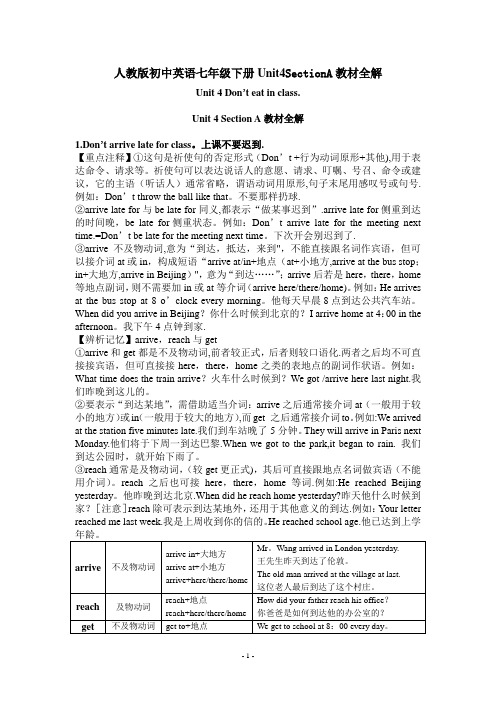
人教版初中英语七年级下册Unit4SectionA教材全解Unit 4 Don’t eat in class.Unit 4 Section A教材全解1.Don’t arrive late for class。
上课不要迟到.【重点注释】①这句是祈使句的否定形式(Don’t +行为动词原形+其他),用于表达命令、请求等。
祈使句可以表达说话人的意愿、请求、叮嘱、号召、命令或建议,它的主语(听话人)通常省略,谓语动词用原形,句子末尾用感叹号或句号.例如:Don’t throw the ball like that。
不要那样扔球.②arrive late for与be late for同义,都表示“做某事迟到”.arrive late for侧重到达的时间晚,be late for侧重状态。
例如:Don’t arrive late for the meeting next time.=Don’t be late for the meeting next time。
下次开会别迟到了.③arrive不及物动词,意为“到达,抵达,来到",不能直接跟名词作宾语,但可以接介词at或in,构成短语“arrive at/in+地点(at+小地方,arrive at the bus stop;in+大地方,arrive in Beijing)",意为“到达……”;arrive后若是here,there,home 等地点副词,则不需要加in或at等介词(arrive here/there/home)。
例如:He arrives at the bus stop at 8 o’clock every morning。
他每天早晨8点到达公共汽车站。
When did you arrive in Beijing?你什么时候到北京的?I arrive home at 4:00 in the afternoon。
我下午4点钟到家.【辨析记忆】arrive,reach与get①arrive和get都是不及物动词,前者较正式,后者则较口语化.两者之后均不可直接接宾语,但可直接接here,there,home之类的表地点的副词作状语。
Unit 4教案2021-2022学年人教版英语七年级下册
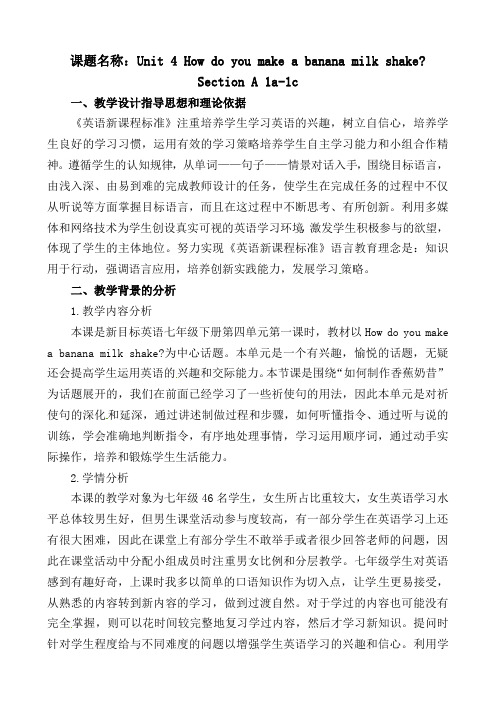
课题名称:Unit 4 How do you make a banana milk shake?Section A 1a-1c一、教学设计指导思想和理论依据《英语新课程标准》注重培养学生学习英语的兴趣,树立自信心,培养学生良好的学习习惯,运用有效的学习策略培养学生自主学习能力和小组合作精神。
遵循学生的认知规律,从单词——句子——情景对话入手,围绕目标语言,由浅入深、由易到难的完成教师设计的任务,使学生在完成任务的过程中不仅从听说等方面掌握目标语言,而且在这过程中不断思考、有所创新。
利用多媒体和网络技术为学生创设真实可视的英语学习环境,激发学生积极参与的欲望,体现了学生的主体地位。
努力实现《英语新课程标准》语言教育理念是:知识用于行动,强调语言应用,培养创新实践能力,发展学习策略。
二、教学背景的分析1.教学内容分析本课是新目标英语七年级下册第四单元第一课时,教材以How do you make a banana milk shake?为中心话题。
本单元是一个有兴趣,愉悦的话题,无疑还会提高学生运用英语的兴趣和交际能力。
本节课是围绕“如何制作香蕉奶昔”为话题展开的,我们在前面已经学习了一些祈使句的用法,因此本单元是对祈使句的深化和延深,通过讲述制做过程和步骤,如何听懂指令、通过听与说的训练,学会准确地判断指令,有序地处理事情,学习运用顺序词,通过动手实际操作,培养和锻炼学生生活能力。
2.学情分析本课的教学对象为七年级46名学生,女生所占比重较大,女生英语学习水平总体较男生好,但男生课堂活动参与度较高,有一部分学生在英语学习上还有很大困难,因此在课堂上有部分学生不敢举手或者很少回答老师的问题,因此在课堂活动中分配小组成员时注重男女比例和分层教学。
七年级学生对英语感到有趣好奇,上课时我多以简单的口语知识作为切入点,让学生更易接受,从熟悉的内容转到新内容的学习,做到过渡自然。
对于学过的内容也可能没有完全掌握,则可以花时间较完整地复习学过内容,然后才学习新知识。
初中英语人教版七年级下册unit4 section A1a--2c
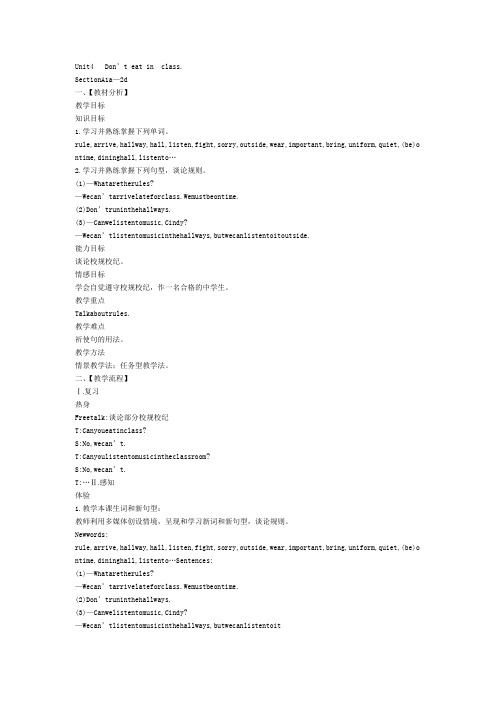
Unit4 Don’t eat in class.SectionA1a—2d一、【教材分析】教学目标知识目标1.学习并熟练掌握下列单词。
rule,arrive,hallway,hall,listen,fight,sorry,outside,wear,important,bring,uniform,quiet,(be)o ntime,dininghall,listento…2.学习并熟练掌握下列句型,谈论规则。
(1)—Whataretherules?—Wecan’tarrivelatef orclass.Wemustbeontime.(2)Don’truninthehallways.(3)—Canwelistentomusic,Cindy?—Wecan’tlistentomusicinthehallways,butwecanlistentoitoutside.能力目标谈论校规校纪。
情感目标学会自觉遵守校规校纪,作一名合格的中学生。
教学重点Talkaboutrules.教学难点祈使句的用法。
教学方法情景教学法;任务型教学法。
二、【教学流程】Ⅰ.复习热身Freetalk:谈论部分校规校纪T:Canyoueatinclass?S:No,wecan’t.T:Canyoulistentomusicintheclassroom?S:No,wecan’t.T:…Ⅱ.感知体验1.教学本课生词和新句型:教师利用多媒体创设情境,呈现和学习新词和新句型,谈论规则。
Newwords:rule,arrive,hallway,hall,listen,fight,sorry,outside,wear,important,bring,uniform,quiet,(be)o ntime,dininghall,listento…Sentences:(1)—Whataretherules?—Wecan’tarrivelateforclass.Wemustbeontime.(2)Don’truninthehallways.(3)—Canwelistentomusic,Cindy?—Wecan’tlistentomusicinthehallways,butwecanlistentoitoutside.2.Makeconversations.(1)—Don’trunint hehallways.—Sorry,Ms.Clark.(2)—Whataretherules?—Well,wecan’tarrivelateforclass.Wemustbeontime. (3)—Canwelistentomusic,Cindy?—Wecan’tlistentomusicinthehallways,butwecanlistentoitoutside.3.Makealistofschoolrules:(1)Don’tarrivelateforclass.Youmustbeont ime.(2)Don’truninthehallways.(3)Don’teatintheclassroom.Youmusteatinthedininghall.(4)Don’tlistentomusicinclass.(5)Don’tfight.Ⅲ.强化巩固1a:Whichrulesarethesestudentsbreaking?Writethenumberoftherulenexttothestudent. 学生独立完成并合作讨论答案,教师检查。
七下英语sectionA 1单元课文和翻译

七下英语sectionA 1单元课文和翻译课文:Singapore may be small, but packs in quite a punch. Only about 655 square kilometers in area it is one of the most densely populated cities in the worldwith about 6430 people per square kilometer.Although it is one of the 20 smallest countries in the worldits economy is a world leader, and has the world's busiest port in terms of tonnage handled.Todaythe financial and technological hub of South East AsiaSingapore was once a sleepy Malay fishing village,which came into its own as a British trading colony in the 1800's. The population is a mix of Malays,Chinese and Indians with a smattering of other ethnic nationalities.There are four official languages in Singapore-MandarinTamilMalay and English. TheChinese ethnic population is oriqinally from South-east China from the provinces of Fukian and Guangdong.Immigrants from the Malaysian peninsulaSumatra, Java and other islands of the Malay Archipelago have thronged the state.About two-thirds of the indians are Tamil. with a smatterina ofMalavalisPuniabis and Guiratis.Sinaapore consists of one main island,and 58 smaller ones.The terrain is flat lowlandthe highest point being Bukit Tima Hills, standing at 164 meters.Its climate is hot (ranging between 22 and 30 degrees centigrade) and muggy (humidity remains at 75%).The rainy season is from November to Januar yalthough being near the equator, intermittent rains occur throughout the yearAlthough about 50% of the land is occupied by vertical urban settlements in modern skyscrapers,Singapore has a thriving agricultural economy specializing in rubbercoprafruitorchidsveg etables, poultryeggs and fish.It is the worlds largest exporter of ornamental fish. It has t hriving industries of electronicschemicals,financial servicesoil drilling equipment rubberprocessing,food processingship repair and other industries with the economy heavily dependant on its electronics and manufacturing exports.With typical Singapore control anddeterminationthe aovernment has made up for its lack of natural flora and fauna by build in a aardens and zoos. waterfalls and underwater parks. sinaapore has one of the best zoosin the world, and has the world's highest man made waterfall in JurongParkstanding at 30 meters. The Bird sanctuary in Jurong even has simulated tropical thunderstorms.翻译:新加坡可能很小,但功能却很强大。
(word完整版)人教版七年级英语下册第四单元教案

UNIT 4Don ’teat in class.Section A第1课时(1a~1c)自主学习方案1.自学生词,并记着拼读及拼写。
2.预习课本找出要点短语及句子。
(见教案自学导练内容)3.读记后达成自学导练内容。
讲堂导学方案Step 1 情形导入Show the students the picture of fighting.T:Look at the two boys. What are they doing?Ss:(Help Ss) :They are fighting.T : Can we fight?Ss:No,we can't.T : What should we say to the boys?Ss:We should say to them: Don't fight.环节说明:经过师生对话引出新知识—祈使句。
Step 2 达成教材 1a_1c 的任务1.学习 la 中的学校规定,高声朗诵这些规定,而后将这些规定的序号填在相对应的人物旁边。
(3 分钟)2.认真听录音,找出Peter, Amy 和 Mike 违犯了哪些规定,在lb 中的横线上写出la中的数字,师生共同查对答案。
(2 分钟)3.再听一遍录音,同时跟读。
(2 分钟)4.练习 lc 中的对话。
而后编写新对话,小组内进行对话练习,并进行组与组之间的比赛,教师评论。
(5 分钟)5.小结训练。
(3 分钟)把以下祈使句改成否认形式。
(1)Eat in the hall.(2)Talk loudly.Don't eat in the hall. Don't talk loudly.环节说明:听闻联合,第一时间向学生传达语言目标,经过结对对话练习和小结训练,学生能够娴熟掌握祈使句。
Step3 问题研究1.arrive 的用法用arrive,arrive in/at 填空。
(1)When do you arrive in Shanghai every week?(2)When I arrive at Yucai Middle School in Shanghai,it is 7:50.(3)After I arrive here, I begin my class.【注意】 arrive“抵达”,arrive 是一个不及物动词,不可以直接跟表示地址的名词。
人教版七年级下英语单元同步练习Unit 4 Don’t eat in class(含答案)
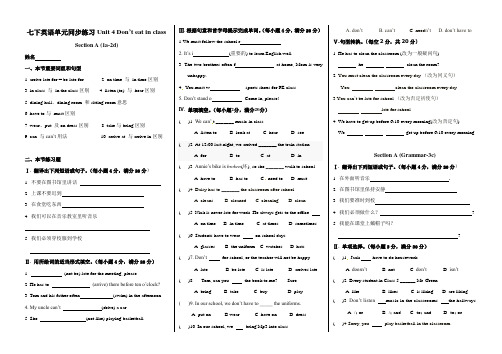
七下英语单元同步练习Unit 4 Don’t eat in classSection A (1a-2d)姓名一、本节重要词组和句型1. arrive late for = be late for2. on time 与in time区别3. in class 与in the class区别4. listen (to) 与hear区别5. dining hall、dining room 和sitting room意思6. have to与must区别7. wear、put 及on dress区别8. take与bring区别9. can 与can’t用法10. arrive at 与arrive in区别二、本节练习题Ⅰ. 翻译出下列短语或句子。
(每小题4分,满分20分)1. 不要在图书馆里讲话2. 上课不要迟到3. 在食堂吃东西4. 我们可以在音乐教室里听音乐5. 我们必须穿校服到学校Ⅱ. 用所给词的适当形式填空。
(每小题4分,满分20分)1. (not be) late for the meeting, please.2. He has to (arrive) there before ten o’clock?3. Tom and his father often (swim) in the afternoon.4. My uncle can’t (drive) a car.5. She (not like) playing basketball. Ⅲ. 根据句意和首字母提示完成单词。
(每小题4分,满分20分)1.We must follow the school r .2. It’s i(重要的) to learn English well.3. The two brothers often f at home, Mom is veryunhappy.4. You must w sports shoes for PE class5. Don’t stand o. Come in, please!Ⅳ. 单项填空。
人教版七年级下册英语Unit4SectionA(1a1c)教学设计
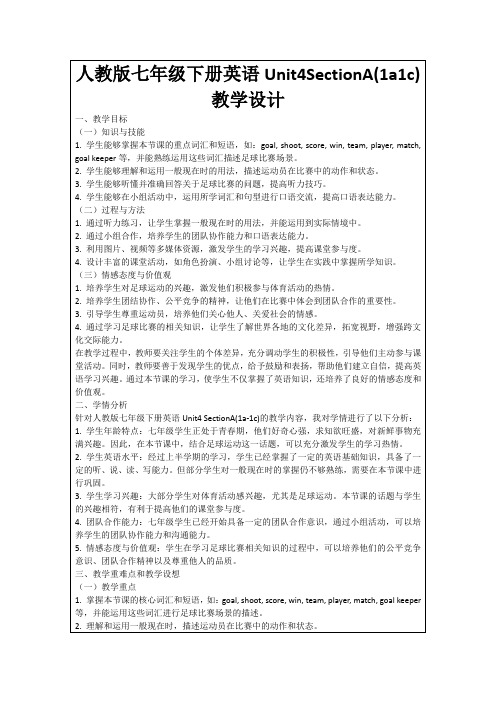
4.学生能够在小组活动中,运用所学词汇和句型进行口语交流,提高口语表达能力。
(二)过程与方法
1.通过听力练习,让学生掌握一般现在时的用法,并能运用到实际情境中。
2.通过小组合作,培养学生的团队协作能力和口语表达能力。
3.利用图片、视频等多媒体资源,激发学生的学习兴趣,提高课堂参与度。
1.学生年龄特点:七年级学生正处于青春期,他们好奇心强,求知欲旺盛,对新鲜事物充满兴趣。因此,在本节课中,结合足球运动这一话题,可以充分激发学生的学习热情。
2.学生英语水平:经过上半学期的学习,学生已经掌握了一定的英语基础知识,具备了一定的听、说、读、写能力。但部分学生对一般现在时的掌握仍不够熟练,需要在本节课中进行巩固。
3.学生跟随教师一起练习一般现在时的句子,巩固所学知识。
4.教师引导学生关注听力材料中的关键信息,教授他们如何快速捕捉比赛场景中的细节。
(三)学生小组讨论
1.教师将学生分成小组,每组选择一位足球明星,了解他们的基本信息和比赛经历。
2.小组内讨论如何用英语介绍这位足球明星,并准备向全班展示。
3.各组展示成果,其他学生认真倾听,学会欣赏和学习他人的优点。
-设定“设计足球比赛海报”的任务,要求学生在海报中运用所学词汇,描述比赛亮点。
4.针对学生的个体差异,实施分层教学,为不同水平的学生提供适当的学习材料和支持。
-为基础薄弱的学生提供更多的词汇卡片和句型模板,帮助他们更好地参与到课堂活动中。
-对于基础较好的学生,设计更具挑战性的角色扮演活动,如模拟足球评论员或记者发布会。
4.学生跟随教师一起朗读和拼写这些词汇,为后续的学习打下基础。
(二)讲授新知
新目标英语七年级下Unit4 SectionA 1a-1c导学案
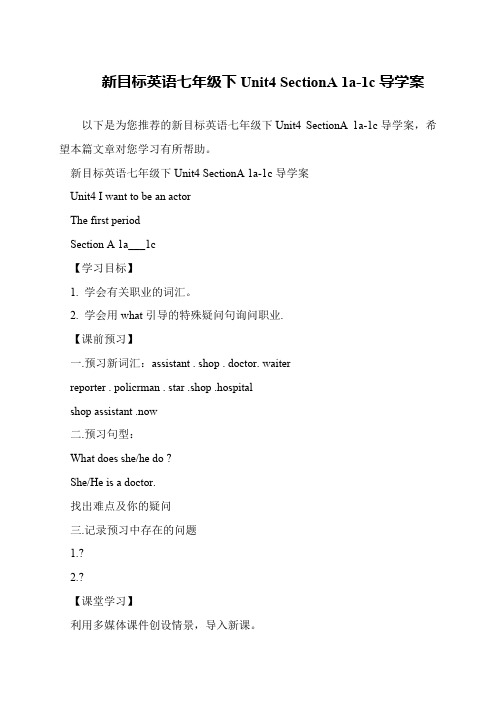
以下是为您推荐的新目标英语七年级下 Unit4 SectionA 1a-1c 导学案,希 望本篇文章对您学习有所帮助。 新目标英语七年级下 Unit4 SectionA 1a-1c 导学案 Unit4 I want to be an actor The first period Section A 1a___1c 【学习目标】 1. 学会有关职业的词汇。 2. 学会用 what 引导的特殊疑问句询问职业. 【课前预习】 一.预习新词汇:assistant . shop . doctor. waiter reporter . policrman . star .shop .hospital shop assistant .now 二.预习句型: What does she/he do ? She/He is a doctor. 找出难点及你的疑问 三.记录预习中存在的问题 1.? 2.? 【课堂学习】 利用多媒体课件创设情景,导入新课。
2.Let the students match the words with the people in the picture. Then the teacher checks the answer. 二.Present the new drills. 1.T: I’m a teacher . What do you do ? S1:I’m a student . T: What does he do ? S2:He is a student. Ask some more students to practise like this. 2.Then work in pairs, they can practise the new drills according to the Next let the students open their books and do 1a. Listen and number 1__3. After that , the teacher checks the answers. 3.Task Let the students make a survey about What does your mother /father /brother do ?” Then write down the information and report to the whole class. Model: A: What does your father do ? B: He is a doctor . model.
人教版英语七年级下册Unit 4 Section A 1a-1c 课件

What are the rules?
Well, we can’t arrive late for class. We must be on time.
Don’t run in the hallways.
What are the other rules?
Don’t eat in the classroom. You must eat in the dining hall.
2) 如果后面跟要听的事物,应跟介词to再跟事物。 Listen to our teacher carefully. 认真听老师讲。
hear, listen和sound都有“听”的意思, 但三者是有区别的。 1) hear “听说” , 侧重于“听” 的内容。例如:
I’m sorry to hear that you are ill. 听说你生病了,我很难过。
4. --What are the rules? 规则是什么?
--Well, we can't arrive late for class.
哦,我们上课不能迟到。
1) rule规则,可数名词,构成的短语有:
obey the rules 遵守规章
be against the rules break the rules
1c
Student A is a new student. Student B tells Student A about the rules above.
What are the rules?
Well, we can’t arrive late for class. We must
be on time.
4. Don’t listen to music 2
2020年人教版七年级英语下册Unit4课时练(SectionA)(有答案)
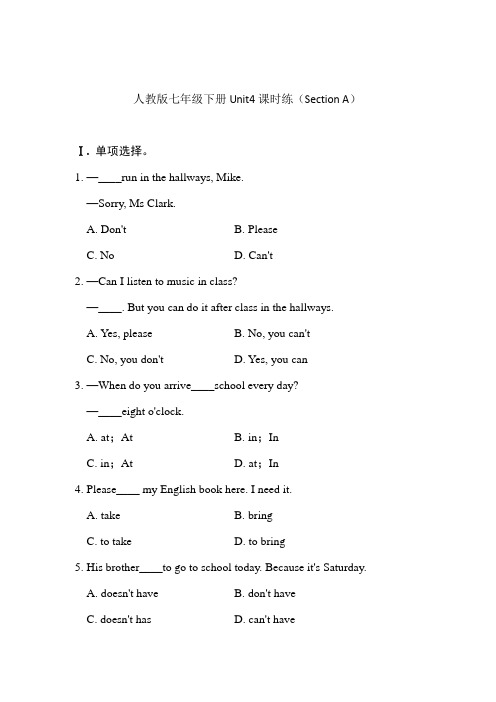
人教版七年级下册Unit4课时练(Section A)Ⅰ. 单项选择。
1. —____run in the hallways, Mike.—Sorry, Ms Clark.A. Don'tB. PleaseC. NoD. Can't2. —Can I listen to music in class?—____. But you can do it after class in the hallways.A. Yes, pleaseB. No, you can'tC. No, you don'tD. Yes, you can3. —When do you arrive____school every day?—____eight o'clock.A. at;AtB. in;InC. in;AtD. at;In4. Please____ my English book here. I need it.A. takeB. bringC. to takeD. to bring5. His brother____to go to school today. Because it's Saturday.A. doesn't haveB. don't haveC. doesn't hasD. can't have6. —Excuse me, Maria. Can I use your bike?—Sure. Here you are. But you must return it ________ time.A. inB. atC. onD. to7. —It's far from the train station. How do you ________ there?—I take the subway.A. arrive atB. arrive toC. arriveD. arrive in8. Don't ________ late for class. It's one of the school ________.A. /; rulesB. is; rulesC. /; ruleD. be; rules9. Hey, Jim! ________ leave your soccer ball in the sports club.A. NotB. Don'tC. NoD. Doesn't10. There _______ some rules in school, and we have to _______ them.A. is; listen toB. are; listenC. are; followD. has ; follows11. There are lots of ________ that students have to follow in school.A. exercisesB. problemsC. skillsD. rules12. The train usually ________ Shanghai at 11:20 a. m. Let's ________the bus station before that.A. arrives in; get toB. arrives to; getC. get; arriveD. get to; arrive13. —May I ________ music in the classroom?—No, you can't. ________ you can't do it in the hallways, either.A. listen; OrB. listen to; OrC. listen; AndD. listen to; And14. ________ listen to music in the classroom.—Sorry, I won't do it again.A. NotB. NoC. DoD. Don't15. ________ a bike to work is good for health.A. RideB. RidingC. TakeD. Takes16. —Why can't Nancy come to your party?—Because she ________ do her homework.A. canB. can'tC. has toD. doesn't have to17. —Look, the lady in red ________ be our English teacher. —No, she ________ be. She is in the office now.A. must; can'tB. can; mustn'tC. may; mustn'tD. shall; can't18. —Mum, may I go swimming now?—Yes, dear, but remember that you ________ go with your dad.A. mayB. canC. must19. Nancy can't go to the movies with us because she ____do herhomework.A. has toB. canC. doesn't have toD. can't20. —Do you have to run every morning?—Yes, I____.A. doB. canC. mayD. need二、根据句意及首字母提示填写单词21. We keep quiet in the h________ and in the library.22. —Can you b________ your family photos to school tomorrow? —Yes, I can.23. I'm s________ I can't finish my homework today.24. He loves sports, so he always w________ sports shoes.25. We usually eat lunch in the dining h________ at twelve.26. Mike never f________ with his brother about small things.27. It's very i________ for a student to keep healthy.28. There are some r________ in the library, such as “No talking”.29. I'm s________ that I can't come to your home for your birthday partytoday.30. We can see some fruit, eggs and hamburgers on the d________ table.三、用所给词的适当形式填空31. Sam's brother plays basketball very well. He is a good basketball ________(play).32. Don't ________ (be) late for school next time.33. The students have to ________ (listen) to their teacher in class.34. It's Monday today. It's my ________(one) day of the weekday.35. After school, she teaches me ________(play) the piano every day.36. ______(not be) late for class.37. He ______(have) to read English every morning.38. Do you have to ______(wear) school uniforms every day?39. Tony ______(not have) to go to school every day.40. Please ______(be) quiet in the library.四、根据汉语意思完成句子41. 有许多男孩可以做的事情。
七年级英语下第四单元Section A 1

Alice: No, we can’t. And we always have to wear the school uniform. John: I see. Alice: Oh, and we also have to be quiet in the library.
1. arrive 到达= get (to) 1) arrive 后面可以不跟到达的地点。 Don’t arrive late for school. 不要上学迟 到。 2) arrive后面也可以跟到达的地点。但后 面必须要跟介词in (大地方)或 at(小地 方)。
2d Role-play the conversation.
2d. Role-play the conversation.
John: Hi, my name’s John. It’s my first day at school. Alice: Hi, John. I’m Alice. This is a great school, but there are a lot of rules. John: Really? What are some of the rules? Alice: Well, don’t be late for the class. This is very important. John: OK, so we must be on time. Can we bring music players to school?
5. ___ √ eat in the dinning hall 6. ___ eat outside 7. ___ √ wear a hat 8. ___ √ fight
2b Listen again. Can Alan and Cindy do these activities? Circle can or can’t above.
- 1、下载文档前请自行甄别文档内容的完整性,平台不提供额外的编辑、内容补充、找答案等附加服务。
- 2、"仅部分预览"的文档,不可在线预览部分如存在完整性等问题,可反馈申请退款(可完整预览的文档不适用该条件!)。
- 3、如文档侵犯您的权益,请联系客服反馈,我们会尽快为您处理(人工客服工作时间:9:00-18:30)。
练一练:用have to, must 填空 1. It’s cold outside. We ______ have to stay at home. 2. We ____ must be good with our parents.
根据各题后括号内的要求完成下列各题。 1. He has to wear the school uniform at school. (改为一般疑问句) Does he ________ have to wear the school _____ uniform at school? 2. They have to do too much homework every day. (改为否定句) They ______________ don’t have to do too much homework every day.
I see.
Can or can’t
•write or draw on the desks •use mobile phones •sit on the desks •speak or laugh loudly in the classroom •run around in the classroom
Don’t run in the hallways.
What are the Don’t eat in the classroom other rules? You must eat in the dining hall.
Don’t listen to music in class. Don’t fight.
5. ___ √ eat in the dinning hall 6. ___ eat outside 7. ___ √ wear a hat 8. ___ √ fight
2b Listen again. Can Alan and Cindy do these activities? Circle can or can’t above.
e.g. They arrived in Beijing at six. 他们六点钟到的北京。 We usually arrive at the village in the morning. 我们通常在早上到那个小村庄。
选词填空: in, at, to
1. My mother usually get ___ to school at 7:40 in the morning. 2. When do you usually arrive ____ at the bus station? 3. Jenny’s uncle usually arrives ___ in Shanghai in the evening.
3. fight 打架,争吵 1) 作动词用 e.g. Jack never fights with his brother. 杰克从不和他的弟弟打架。 2) 作名词,意为“打架;争吵”; 常用词 组have a fight“打架;吵架” e.g. Did you have a fight with her? 你和她吵过架吗?
2d Role-play the conversation.
1. arrive v. 到达= get (to)
1) arrive 后面可以不跟到达的地点。 e.g. Don’t arrive late for school. 不要上学迟到。
2) arrive后面也可以跟到达的地点。但 后面必须要跟介词in (大地方)或 at (小地方)。
Rain! Rain! Go away! Come again anothБайду номын сангаасr day! Little Johnny wants to play. Rain! Rain! Go away! Come again another day! It's mother's washing day.
hallway n. 走廊 fight v. n. 打架
1. listen to music in the classroom or hallways 2. listen to music in music room 3. listen to music outside 4. eat in the classroom 5. eat in the dining hall 6. eat outside 7. wear a hat 8. fight can can’t
Uh-huh.
We can’t eat in the classroom, but we can eat in the dining hall.
Oh, can we wear a hat in class?
No, you can’t. What else? Oh, you can’t fight with your classmates. That makes the teachers really unhappy.
含有have to的句子变一般疑问句或否定 句时要借助助动词do / don’t或does / doesn’t;而含有must的句子变一般疑问 句是直接将must提前至句首,变否定句 是在must后加not。如: He doesn’t have to do it. 他不必做那件事。 He mustn’t do it. 他不许做那件事。
Tell your classmate what the rules should be.
Don’t fight with your classmates.
Don’t listen to music in the classroom.
Don’t arrive late for school.
Don’t eat in the classroom. You must eat in the dining hall.
dining hall 食堂
listen to 听…
music player
wear a hat 戴帽子
sorry adj. 对不起
uniforms n. 制服
outside adv. 外出
arrive v. 到达
Don’t arrive late for class. You must be on time. Don’t fight!
4. wear v. 意为“穿、戴” e.g. My aunt wears a blue skirt and a white T-shirt. 我姑姑穿着蓝色的裙子,白色的T 恤。 Does he wear glasses? 他戴眼镜吗?
5. have to与must have to着重于客观的需要,含有“不 得不”的客观强制性;must着重于主 观上自己认为有义务、有必要。如: She has to clean the room every week. 她每周都得打扫房间。 I must go now. 我现在必须走。
Don’t listen to music in class.
1. Don’t arrive late for class. You must be on time. 2. Don’t run in the 5 hallways. 4 3. Don’t eat in the 3 classroom. You must eat in the dining hall. 4. Don’t listen to music in class. 5. Don’t fight.
Don’t run in the hallways.
1c Student A is a new student. Student B tells Student A about the rules above.
What are the rules?
Well, we can’t arrive late for class. We must be on time.
2
1a Which rules are these students breaking? Write the number of the rule next to the student.
1b Listen. What rules are these students breaking? Write the numbers after the names. Peter ______ Amy ______ Mike ______
Does he have to do it? 他不得不做那件事吗? Must he do his homework? 他必须做他的作业吗?
在否定句中,don’t / doesn’t have to表示 “没有必要”,must not / mustn’t表示 “不允许”。如: You don’t have to go there. 你不必去那儿。 You must not / mustn’t go there. 你不许去那儿。
can can can can can can can
can’t can’t can’t can’t can’t can’t can’t
2c Student A is Alan. Student B is Cindy. Talk about the rules in 2a. What are the school rules, Alan? Well, we can’t listen to music in the classroom or hallways. But we can listen to music in music room.
3. Can he bright music players to school? No, he can’t. _______________ 4. Do they have to always wear the school uniform? _______________ Yes, they do.
